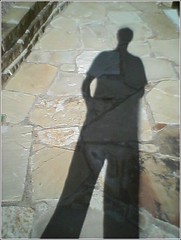Still falls the rain—
Dark as the world of man, black as our loss—
Blind as the nineteen hundred and forty nails
Upon the cross.
Still falls the rain—
With a sound like the pulse of the heart
That is changed to the hammer-beat
In the potter's field, and the sound of the impious feet
On the tomb:
Still falls the rain—
In the field of blood
where the small hopes breed and the human brain
Nurtures its greed, that worm with the brow of Cain.
Still falls the rain—
At the feet of the starved man hung upon the cross.
Christ that each day, each night, nails there, have mercy on us—
On Dives and on Lazarus:
Under the rain the sore and the gold are as one.
Still falls the rain—
Still falls the blood from the starved man's wounded side:
He bears in his heart all wounds, — those of the light that died,
The last faint spark
In the self-murdered heart,
the wounds of the sad uncomprehending dark,
The wounds of the baited bear—
The blind and weeping bear whom the keepers beat
On his helpless flesh…the tears of the hunted hare.
Still falls the rain—
Then— O Ile leape up to my God: who pulles me doune—
See, see where Christ's blood streames in the firmament:
It flows from the brow we nailed upon the tree
Deep to the dying, to the thirsting heart
That holds the fires of the world, — dark-smirched with pain
As Caesar's laurel crown.
Then sounds the voice of one who like the heart of man
Was once a child who among beasts has lain—
“Still do I love, still shed my innocent light, my blood, for thee.”
The Blitz is the word that the English use to refer to the sustained German bombing of London and other cities across the United Kingdom between September 1940 and May 1941, during which over 43,000 people perished. In 1942, Dame Edith Sitwell composed this poem in direct response to the Blitz. Sitwell once described this poem in a letter to Benjamin Britten as one of the proudest achievements of her life. With its insistent rhyme and images of Christian suffering, the poem has a relentless quality, much like the bombardment which it memorializes. Of its more obscure references include Potter’s field (a place of burial for the unknown), the brow of Cain (the Bible's first murderer), and Dives and Lazarus (a Biblical pairing of the wealthy man and the destitute beggar) who become equal under the violent rain of war.

No comments:
Post a Comment